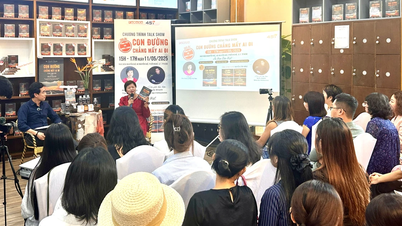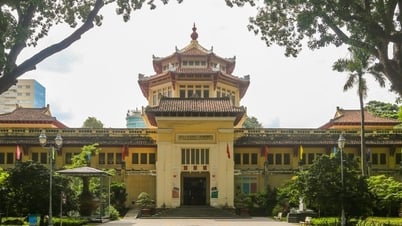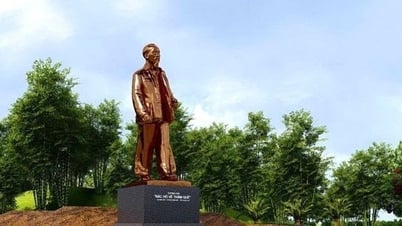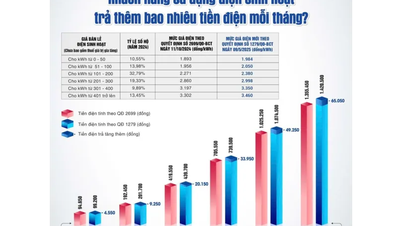From studiousness to reading culture
As a country with a thousand-year-old culture, Vietnam is proud to preserve many precious traditions. Vietnamese people are therefore nurtured with many good qualities: steadfast in combat, diligent in work and especially rich in the virtue of learning. The tradition of learning, combined with patriotism and the culture of defending the country, not only creates the character and identity of the Vietnamese people but also helps Vietnam to develop more and more.
President Ho Chi Minh is a shining example of the nation's studiousness with the spirit of continuous learning. During his lifetime, he once emphasized: "The path of life is a ladder without a last step; learning is a notebook without a last page." That saying is not only a reminder, but also a torch to light the way for future generations. People with studiousness are those who have the need to learn throughout their lives, learning can only move forward, and cannot stop.
Along with the tradition of learning from ancient times, we cannot fail to mention the important role of reading, which is closely associated with learning. Through each historical period, reading, especially reading books, has always been considered by our ancestors as an essential way to expand knowledge, cultivate morality and perfect personality. Many ancient examples have left a deep impression on the spirit of learning, reading, considering books as indispensable companions in life. Looking back at the history of the nation, it is easy to see that the love of books and the spirit of reading of our ancestors have been deeply rooted through many generations. We can mention the ancestors who loved reading books all their lives and were always respected by later generations such as scholar Le Quy Don, first-rank mandarin Nguyen Truc, Mac Dinh Chi, doctor Nguyen Huy Can, grand scholar Than Nhan Trung...
Among them, Mac Dinh Chi is a typical example of being passionate about reading, diligently reading and pondering over books to become talented. Born into a poor family, his childhood was associated with the work of collecting firewood to help his family. However, no matter how hard it was, he never stopped nurturing his passion for words. Having a book in his hand, he treasured it like finding gold. His poor family did not have enough oil to light the fire, so he lit a fire to study, taking advantage of every moment to read and ponder. Thanks to that, he passed the imperial examinations and became a famous scholar.
In addition to being shining examples, our ancestors were also the ones who “passed on the fire”, aroused and preserved the tradition of valuing reading for posterity through the teachings that have been passed down to this day. As scholar Le Quy Don once compared the value of books to that of gold and silver when he said, “Even if there were a hundred thousand taels of silver and gold/It would not be worth a few volumes of classics and history” or when he quoted the ancients: “Reading books and finding a meaning is like finding a boat of pearls” to open the “Knowing the Little Record” section, “Cham Canh”.
Not only scholars or talented people value reading, but even the kings who are at the top of the world always pay special attention to books. Although they are busy with a thousand and one things, if they are kings who are responsible for the country, they absolutely cannot stay away from books. King Le Thanh Tong once advised his subjects: "Try to study hard to understand the principles, be wise and protect yourself". King Minh Mang also contemplated: "Reading books is very beneficial for the human spirit". These teachings not only show respect for books but also vivid evidence of a lasting reading culture tradition of a nation and an era.
Reading culture past and present
It can be seen that reading culture and respect for books have become a tradition and custom that has existed for many generations. Although history has gone through many changes and upheavals, the values associated with books and reading culture have always been preserved. Although there have been ups and downs, they have never faded, but on the contrary, they have been nurtured and passed on like a never-ending source. However, when looking back at the reading culture of Vietnamese people, past and present, we cannot help but recognize the obvious changes.
In ancient Vietnamese society, people were divided into four categories: scholars, farmers, workers, merchants/scholars, farmers, workers, and merchants. Scholars were the learned, scholarly class, ranked at the top, and of course this class had to know how to read books. Books here were mainly books of sages, commonly the Four Books and Five Classics. At that time, books were extremely rare, partly because printing technology had not yet developed, and were mainly passed down by handwriting, so only well-off families or intellectual families with long-standing education could afford to own them. Therefore, those who had books often had a very high regard for books.
 |
The kings who ruled the world also read books diligently. (Illustration - Source: SyHoa) |
Of course, because of its value, reading books was very important and meticulous for the ancients, especially the wise and virtuous, and even considered it a sacred ritual. The ancients considered reading books as a journey to contact the sages through each page. They believed that books were written by sages, who were well-educated and knowledgeable people, and that books of sages always contained very valuable sources of knowledge. Therefore, before reading, they often fixed their hair, bathed, and kept their minds and spirits refreshed and clear as a way to show respect for knowledge.
In particular, when reading books, the ancients did not rush through them, but had to “chew” each word and ponder each idea. What they did not understand would be remembered to ponder over gradually, not casually ignored. Because they believed that a writer could write one sentence a week, one article in three years, and that article was so profound that one could not ponder it all in a lifetime, so when reading a book, one had to read it carefully for the book to have real value. Thanks to that, although there were few books in the past, Confucian scholars still had a deep and profound level of knowledge.
However, besides the slow reading style, pondering each sentence and each word, there are still many Confucian scholars who possess outstanding reading ability, reading quickly, remembering for a long time, and reciting by heart after only reading once. Such people are truly talented, possessing rare qualities and memories, and even the way they read books is different from ordinary people. For example, Minister Ha Quyen of the Nguyen Dynasty, was recognized by Doctor Truong Quoc Dung as someone who had the ability to read "several lines at a time".
Bui Duong Lich - author of Nghe An Ky, an erudite scholar, was also described in Thoai Thuc Ky Van as: "The gentleman reads books very quickly, a few lines at a time, and can distinguish people by reading the text". In short, although each person has their own way of reading, slowly pondering or quickly and clearly, the destination is still the same: to distill the essence, receive knowledge and contemplate the golden words and jade ideas hidden in each page of the precious book.
From the above points, it can be seen that the change in the reading culture of Vietnamese people from the past to the present is quite clear, both in form and approach. If in the past, to get a book, to access valuable knowledge from books was not simple, today, anyone can read books. Even in the era of strong technological development, paper books are gradually losing their unique position, giving way to e-books - a more modern and convenient form of reading.
With just a compact device like a phone or e-reader, users can access thousands of books, read anytime, anywhere without being limited by space or time. But that convenience comes with challenges, the habit of reading deeply, reading carefully, reading thoughtfully as people used to do is gradually being replaced by skimming, reading quickly, receiving information in a fragmented and easily forgotten way.
However, this does not mean that reading culture in the present era has become less valuable. On the contrary, the development of technology has opened up new opportunities to arouse and spread reading habits to more people. Obviously, the core issue lies not in the form or means of reading but in the spirit and attitude of the reader. As long as people still consider reading an essential need to nourish the mind and sharpen intelligence, then reading culture will continue to be "fueled" over time.
Source: https://baophapluat.vn/net-dep-van-hoa-doc-trong-lich-su-truyen-thong-dan-toc-post547892.html





![[Photo] General Secretary To Lam meets and expresses gratitude to Vietnam's Belarusian friends](https://vphoto.vietnam.vn/thumb/1200x675/vietnam/resource/IMAGE/2025/5/11/c515ee2054c54a87aa8a7cb520f2fa6e)
![[Photo] General Secretary To Lam arrives in Minsk, begins state visit to Belarus](https://vphoto.vietnam.vn/thumb/1200x675/vietnam/resource/IMAGE/2025/5/11/76602f587468437f8b5b7104495f444d)
![[Photo] General Secretary To Lam concludes visit to Russia, departs for Belarus](https://vphoto.vietnam.vn/thumb/1200x675/vietnam/resource/IMAGE/2025/5/11/0acf1081a95e4b1d9886c67fdafd95ed)
















![[Photo] National Assembly Chairman Tran Thanh Man attends the Party Congress of the Committee for Culture and Social Affairs](https://vphoto.vietnam.vn/thumb/1200x675/vietnam/resource/IMAGE/2025/5/11/f5ed02beb9404bca998a08b34ef255a6)

































































Comment (0)